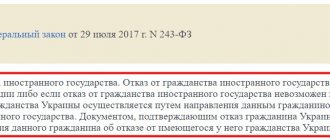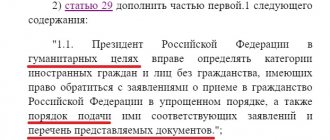Concept and principles of citizenship
Citizenship is a stable legal connection between a person and the state, expressed in the totality of their mutual rights and obligations.
The Constitution of the Russian Federation enshrines only the basic principles of the institution of citizenship (including in Chapter 1 “Fundamentals of the Constitutional System”), while the detailed regulation of this constitutional and legal institution is enshrined in the Federal Law of May 31, 2002 No. 62-FZ “On Citizenship of the Russian Federation” with change and additional (hereinafter referred to as the Law on Citizenship), adopted to replace the RF Law of the same name dated November 28, 1991 No. 1948-1. The main innovations of the new law boil down to greater rigidity of its rules on the acquisition of Russian citizenship compared to the rules provided for by the previous law, however, on November 11, 2003, a number of changes and additions were made to the Citizenship Law to facilitate the procedure for acquiring Russian citizenship for certain categories of applicants , primarily compatriots from the CIS countries.
For persons who already have citizenship of the Russian Federation on July 1, 2002 (the day the law entered into force), no re-registration or re-registration of citizenship is required.
The Constitution of the Russian Federation and the Law on Citizenship enshrines the following principles of citizenship of the Russian Federation:
- Unity of citizenship. In accordance with this principle, republics - subjects of the Russian Federation cannot establish their own citizenship, which provides for exceptions from the general, unified status of a citizen of the Russian Federation (the Citizenship Law, unlike the 1991 Law, does not speak at all about the citizenship of the republics within the Russian Federation); a citizen of the republic is at the same time a citizen of the Russian Federation; the legal status of a Russian citizen living in any republic is the same throughout the entire territory of Russia and is no different from the status of a Russian citizen living in another subject of the Russian Federation; the establishment of citizenship by a republic within the Russian Federation does not give rise to dual citizenship of a person living in this republic - the Russian Federation and the corresponding republic.
- Equality of citizenship regardless of the grounds for acquiring citizenship, as well as gender, nationality, age, social origin and status, etc. In particular, the citizenship of a married woman in Russia does not depend on the citizenship of her husband (and vice versa), the conclusion or dissolution of a marriage between a citizen of the Russian Federation and a person who does not have Russian citizenship does not entail a change in the citizenship of these persons; a change in citizenship by one of the spouses does not entail a change in the citizenship of the other spouse (Article 8 of the Citizenship Law).
- Preservation of citizenship when a citizen of Russia lives abroad. There are no deadlines after which, if a Russian citizen lives in another state, he would lose citizenship of the Russian Federation. The right to change citizenship is an inalienable right of any Russian citizen; refusal to renounce citizenship of the Russian Federation can only be motivated and on the basis of suspensive circumstances provided for by law.
- The impossibility of depriving a citizen of the Russian Federation of citizenship or the right to change it. This principle is intended to ensure the unhindered exercise by a citizen of his rights without fear of losing Russian citizenship (in particular, for dissent, disagreement with the policies of the authorities, etc.). If a Russian citizen carries out any illegal activity, various types of liability and punishment may be applied to him, but Russian legislation does not and cannot provide for such a sanction as “deprivation of citizenship.”
- The impossibility of expelling a Russian citizen from Russia or extradition to a foreign state (extradition). A citizen of Russia cannot be expelled from the country, nor can he have obstacles to returning to his homeland (at the same time, this principle does not limit the powers of government bodies of the Russian Federation to expel foreign citizens and stateless persons from Russia on the grounds provided by law). A Russian also cannot be extradited to another state in the event of committing an offense abroad and presenting a corresponding request from that state for extradition for the purpose of bringing to justice (extradition of other persons located on the territory of the Russian Federation is possible on the basis of interstate treaties on legal assistance for criminal prosecution responsibility or execution of a sentence). However, if the committed act for which a Russian citizen is being prosecuted is also illegal from the point of view of Russian legislation, then this citizen must be held accountable according to the norms of the legislation of the Russian Federation.
KP / Principles of Russian citizenship
Principles of Russian citizenship
The Constitution of the Russian Federation and the Law on Citizenship establish, first of all, those general principles that determine the essential features of citizenship relations. Among them, the following should be highlighted.
1. Citizenship of the Russian Federation is uniform. Due to the federal structure of Russia, this principle is one of the most important and is enshrined in the Constitution (Article 6).
Single citizenship in a federal state is a necessary condition for its sovereign status and preservation of integrity.
2. Citizenship of the Russian Federation is equal regardless of the grounds for acquisition.
3. Citizenship of the Russian Federation is open and free. First, every person has the right to a citizenship; Secondly, the free nature of citizenship of the Russian Federation is expressed in the fact that the Constitution and Law enshrine the right of a citizen to change citizenship.
4. A citizen of the Russian Federation cannot be deprived of his citizenship. Deprivation of citizenship is the termination of civil ties at the initiative of the state, unilaterally, without providing for the consent of the citizen as a condition.
the human right to citizenship, the bilateral nature of the relationship between a person and the state, which presupposes the termination of this connection by both parties only by mutual consent.
5. A citizen of the Russian Federation may have citizenship of a foreign state (dual citizenship). Art. 62 of the Constitution of the Russian Federation).
The Law states that a person who is a citizen of the Russian Federation is not recognized as belonging to the citizenship of another state, unless otherwise provided by an international treaty of the Russian Federation. The acquisition by a citizen of the Russian Federation of another citizenship does not entail the termination of his Russian citizenship.
Citizens of the Russian Federation who also have another citizenship cannot, on this basis, be limited in their rights, evade fulfillment of duties or be released from responsibility arising from citizenship of the Russian Federation.
6. Russian legislation is based on the principle of maintaining citizenship of the Russian Federation by persons living outside its borders. Art. 27 of the Constitution.
7. Citizenship of the Russian Federation is based on the denial of its automatic change when a citizen of the Russian Federation enters into or dissolves a marriage with a person not belonging to its citizenship, as well as when the citizenship of the other spouse changes. This reflects the essence of citizenship as an individual, personal connection of a person with the state, the inadmissibility of automatic termination of citizenship, without the will of the person and compliance with the established procedure.
8. The Russian Federation guarantees its citizens protection and patronage outside its borders. This principle is enshrined in the Constitution of the Russian Federation (Article 61) and in the Law on Citizenship. The Constitution establishes that a citizen of the Russian Federation cannot be expelled from its borders or extradited to another state. For crimes committed by a Russian citizen abroad, he is subject to criminal liability under the laws of his country.
Grounds for acquisition and loss of citizenship
In accordance with Ch. 2 of the Law on Citizenship, citizenship of the Russian Federation can be acquired on the following grounds:
- by birth (filiation);
- as a result of admission to citizenship (naturalization);
- as a result of restoration of citizenship (reintegration);
- as a result of choosing citizenship (option).
When acquiring citizenship by birth in countries around the world, two basic principles are applied: the principle of “jus sanguinis”, according to which the citizenship of the child is determined by the citizenship of the parents, regardless of the place of birth, and the principle of “jus soli”, according to which the citizenship of the child, on the contrary, is determined by the place of birth. birth, the territory of the state in which he was born, regardless of the citizenship of his parents. The use of the first or second principle as the predominant one in a particular state is determined by a number of factors (tradition, number and density of population, demographic policy, etc.) and does not exclude their combination.
In the Russian Federation, when determining the citizenship of born children, both principles are applied, but the principle of “right of blood” prevails. This means that, regardless of the place of birth, a child acquires Russian citizenship if both of his parents or a single parent are citizens of the Russian Federation, and also if one of his parents has Russian citizenship, and the other is a stateless person, or is declared missing, or his place of birth is location unknown.
At the same time, Russian legislation allows the application of the principle of “law of the soil”, primarily in order to eliminate and reduce the statelessness of born children. This is possible if the child is born on Russian territory in the following cases:
- if one of the parents has Russian citizenship and the other is a foreign citizen. It should be noted that in such a situation, the child can also acquire citizenship of the state of which the second parent is a citizen, however, if the legislation of this state does not provide for such a possibility and the child can become a stateless person, then he acquires citizenship of the Russian Federation under Russian legislation;
- if both parents (or the only parent) living on the territory of the Russian Federation are foreign citizens or stateless persons, provided that the states of which the parents (or the only parent) are citizens do not grant their citizenship to the child;
- if the child’s parents are unknown and do not show up within six months from the date of his discovery on the territory of the Russian Federation. In this case, the exact place of birth of the child is unknown, but a kind of presumption of his birth is established on the territory of Russia, giving grounds for acquiring Russian citizenship according to the principle of “right of soil.”
Filiation is the most common and simple basis for acquiring citizenship and does not require any special procedure. Citizenship, in the presence of the considered conditions, is acquired as if automatically, by virtue of the very fact of the child’s birth (an insert is issued with the birth certificate confirming that the child has citizenship of the Russian Federation, the form of which is approved by Decree of the Government of the Russian Federation dated 02/06/03. No. 61 “On approval of the form of the insert on the birth certificate confirming the child’s citizenship of the Russian Federation”).
Admission to citizenship (naturalization) involves a more complex special procedure and more stringent conditions. Admission to Russian citizenship can be carried out in a general or simplified manner. Conditions for naturalization in general:
- a foreign citizen or stateless person has reached the age of 18 and has legal capacity (naturalization of minor children is carried out in a simplified manner);
- residence qualification (residence qualification) - a person wishing to acquire citizenship of the Russian Federation must, at the time of applying for the corresponding application, have continuously resided in the territory of Russia for five years, while having a residence permit (preliminary receipt of a residence permit is a prerequisite for applying for with an application for admission to Russian citizenship, illegal and semi-legal actual residence is not taken into account); the period of residence on the territory of the Russian Federation is considered continuous if a person has traveled outside Russia for no more than three months within one year (the previous citizenship law provided for a more lenient residency requirement - five years of permanent residence or three years of continuous residence). For persons who arrived in the Russian Federation for permanent residence before July 1, 2002 (the date of entry into force of the Citizenship Law), the period of residence is calculated from the date of registration at the place of residence. The period of residence on the territory of the Russian Federation as a mandatory condition for naturalization can be reduced to one year in the following cases: the applicant has high achievements in various fields of science, technology, culture, art, sports, etc. and professional qualities (specialties, qualifications etc.) of interest to Russia;
- granting the applicant political asylum on the territory of the Russian Federation or recognizing him as a refugee in the prescribed manner.
If a foreign citizen or stateless person who wishes to acquire Russian citizenship has special merits to the Russian Federation (outstanding achievements in the field of science, technology, production, culture, sports, significant contribution to the development of society and the economy, ensuring the defense capability and security of the Russian Federation, other merits , contributed to increasing the international prestige of Russia, confirmed using a mechanism for objective assessment of these merits), then citizenship at the request of a federal government body or the head of a constituent entity of the Russian Federation can be granted without complying with the conditions discussed above. Thus, in 2003, Russian citizenship was granted to 3. Tsereteli, American basketball player John Holden. Without complying with the general conditions for naturalization, Russian citizenship can also be granted to citizens of states of the former republics of the USSR who served in the Russian Armed Forces under a contract for at least three years. To do this, you only need a document confirming your knowledge of the Russian language, an obligation to renounce your existing citizenship, as well as a petition from the Ministry of Defense of the Russian Federation or another federal executive body, which provides for military service.
The final decision on admission to Russian citizenship in a general manner is made by the President of the Russian Federation by issuing an individual decree, and the period for making such a decision can be up to one year from the date of submission of the application and all necessary and properly executed documents.
Naturalization in Russia can also be carried out in a simplified manner. This procedure is provided for both children and incapacitated persons, as well as for adult and capable foreign citizens and stateless persons. In the first case, the will to acquire citizenship by incapacitated (or not fully capable) persons is expressed by their legal representatives: parents, guardians, trustees. To implement this procedure for adult and legally capable applicants, the following conditions are required:
- the presence of at least one parent - a citizen of the Russian Federation living in Russia;
- residence in the CIS and Baltic states of former citizens of the USSR, if they have not yet received citizenship of the state of residence and remain stateless;
- receipt of vocational education (secondary or higher) by citizens of the CIS or Baltic states in educational institutions of Russia after July 1, 2002;
- the birth of a foreign citizen or stateless person on the territory of the RSFSR before the collapse of the USSR and his past citizenship of the USSR;
- being married to a citizen of the Russian Federation for at least three years (i.e., the mere fact of marriage to a Russian citizen, as well as a short-term marriage, does not give the right to reduce the residency requirement);
- the disabled applicant has adult capable children - citizens of Russia, etc.
Issues of admission to Russian citizenship in a simplified manner, including making a final decision, are dealt with by the authorized executive authorities - the Ministry of Internal Affairs and the Ministry of Foreign Affairs of Russia through the relevant structures on the territory of the Russian Federation and abroad. Since this procedure is simpler and allows issues to be resolved locally, the period for making a decision is halved: it cannot exceed six months from the date of submission of the application and all necessary documents.
Restoration of citizenship of the Russian Federation at first glance does not seem to be a completely logical basis for acquiring citizenship, since there is a principle of the impossibility of deprivation of citizenship (and in the legislation of most states there is no such basis for acquiring citizenship). But the Law on Citizenship contains this basis, although its legal regulation has changed significantly compared to the previous law. If previously restoration of Russian citizenship was carried out according to a fairly simple procedure (in the order of registration) and was relevant, in particular, for persons who in the past were deprived of Soviet citizenship against their will, now these persons can acquire citizenship of the Russian Federation only in a general manner , i.e. in the order of naturalization. At the same time, on this basis, foreign citizens and stateless persons who previously had citizenship of the Russian Federation, but then changed or lost it (for example, due to a change in the citizenship of their parents, adoption, establishment of guardianship or trusteeship, can acquire Russian citizenship renunciation of Russian citizenship). However, the procedure for acquiring citizenship of the Russian Federation by way of restoration is the same as for admission to citizenship in the general manner, with only one mitigating condition - the period of residence on the territory of Russia for applicants here has been reduced to three years.
The choice of citizenship (option) as a basis for acquiring citizenship of the Russian Federation may occur when the state border is changed in connection with the annexation of new populated territories to Russia. In this case, persons living in the territory whose nationality has been changed have the opportunity to choose Russian citizenship with the unconditional right to retain their previous citizenship. The procedure and terms of the option must be established by the relevant international treaty. It should be borne in mind that the option can serve as the basis for termination of citizenship of the Russian Federation in the event of the transfer of part of the Russian territory in accordance with an international treaty under the jurisdiction of another state, if in this situation Russian citizens wish to change Russian citizenship to the citizenship of the state to which the corresponding territory was transferred .
In addition to the option, the grounds for termination of citizenship of the Russian Federation are withdrawal from Russian citizenship and cancellation of the decision to grant Russian citizenship.
Renunciation of citizenship of the Russian Federation, although it is a voluntary act, must be carried out according to a certain procedure: in the general manner (with the submission of an application addressed to the President of the Russian Federation, who makes the final decision), if the citizen lives in Russia, or in a simplified manner (application submitted and reviewed by the relevant structures of the Ministry of Foreign Affairs of the Russian Federation) if a Russian citizen lives in a foreign country. Termination of the citizenship of the Russian Federation of a child, one of whose parents or only parent is a foreign citizen, can also be carried out in a simplified manner (in this case, the issue will be considered by the relevant structures of the Ministry of Internal Affairs of Russia); In the case of adoption of a child - a citizen of Russia by a foreign citizen (or foreign citizens), the child's citizenship may be terminated in accordance with the general procedure.
Renunciation of Russian citizenship may be denied on the following grounds:
- if the applicant has an unfulfilled obligation to the Russian Federation stipulated by federal law (for example, the period of military service has not expired, there are arrears on taxes and fees, the established period has not expired since the last access to information constituting a state secret, etc.);
- if the applicant is brought to criminal liability in the prescribed manner (the court’s conviction has entered into force, charges have been brought in a criminal case);
- if the applicant does not have another citizenship and guarantees of its acquisition (this restriction may not seem entirely democratic, although its purpose is obvious - to eliminate the situation of statelessness).
In contrast to renunciation of citizenship, the cancellation of a decision on admission to citizenship of the Russian Federation is carried out by government bodies regardless of the will of the citizen. The basis for canceling a decision on admission to citizenship is the establishment of facts of submission by the applicant of forged documents or knowingly false information, and such facts must be established only in court. The cancellation of the decision on admission to Russian citizenship is made by the body that made the decision on admission to citizenship: the President of the Russian Federation, the relevant structures of the Ministry of Internal Affairs or the Ministry of Foreign Affairs of Russia. The Citizenship Law does not contain a statute of limitations for making the decision in question - cancellation of the decision on admission to citizenship can take place at any time (previous legislation contained a statute of limitations of five years, after which the cancellation of the decision on admission to citizenship was impossible). Cancellation of a decision to grant citizenship to a citizen does not automatically terminate the citizenship of his spouse, children and other relatives (the citizenship of a child in this case can be terminated only with the written consent of the other parent - a citizen of the Russian Federation and provided that the child does not become stateless ).







